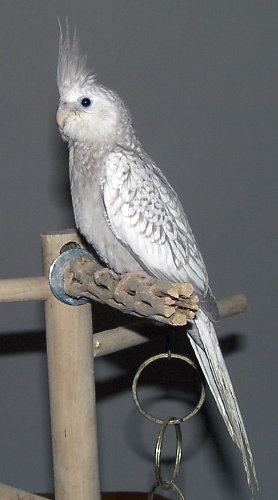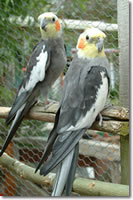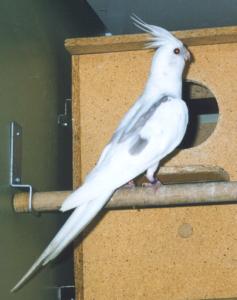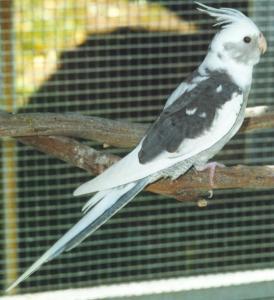NEW ADDRESS FOR MEMBERS GREYFORUMS.ORG
-
Posts
14,710 -
Joined
-
Last visited
-
Days Won
1
Content Type
Profiles
Forums
Events
Gallery
Everything posted by Dave007
-
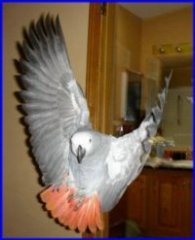
alittle bite of a peanut butter and honey sandwich good or not?????
Dave007 replied to Tess Denise's topic in Bird Food
The small amount you gave won't hurt the bird. Just don't do it everyday. Both items have sugar in them and too much sugar is a no no. You can't go by what another person did in the past because you really have no idea what amount was used. Honey/ molasses is sugar and is used by bird treat companies to be a binder to keep the treats together. It's mostly used with different seed treats but they use verry little of those items. Just use a very small amount 2x a week -
You should really leave that pigeon alone. It's been around fior a week and so far it's fine. Leave it outside. They survive very well outside. Pigeons are just like any other wild birds outside--titmice---chickadees----gold finches--barn swallows--wrens etc. They all carry different diseases that they themselves are immune to. Using your parrot equipment to house the bird is crazy. I would never go to any pet store to buy any food. I grew up in an inner city area ( manhattan) that had thousnads of pigeons around and people ( especially old people people who used to just sit in the parks fed them for years when they were around which actually was 24/7. Ever hear of Central Park, Rockafeller Center, Washington Square PK in Greenwich Village? Well for the last 6 yrs, The Mayor of New York has made feeding pigeons against the law. Fines are given if caught. They multiple like crazy. But if you wanna feed that pigeon, just take a slice of bread, let it go very stale, crush it up or just make some toast, crush it up and feed or you can take all the left over seed shells from your parrot's dish and throw it out. They're scavengers and will eat anything that they can swallow.
-
I have no intention of insulting you here. Just being blunt and truthful. You have some major things here that you want to happen but most of them have to do with long term lengthy time with your bird. The longer the bird is on it's own, the harder it is to train. many people here you that their daily lives changed a bit when they started owning parrots. Others will say they had no problems with the birds but that was only because they dealt with the bird when it was very young. First off, you need to know the personality of an african grey which is different than another species and that other species is different than another species etc etc. All parrots are wild animals and will remain that way throughout their lives no matter where they live. Adult greys are very aloof. Dealing with a wild animal is different than dealing with domestic animals. Domestic animals strive to make their owners happy. Parrots really don't care about that. As adults, greys are not what you would call cuddly. Other species are and other species aren't. Greys don't mind being left alone. They don't need to be dealt with on a constant basis but any training has to be done on a steady basis. Lots of time is put into training and it needs to be a constant thing. Greys are obstinent about doing new things unless they're worked with on a steady basis. Each thing has to be done on a long term basis. *****I'd like to do some training with him to teach him a few useful tricks (e.g flying to me on command, flying to a perch, step up (first or even second time of asking!), drop an item he is holding etc).***** Other than the dropping of an item he's holding, all of the rest of the things you mention don't come under the catagory of tricks. It's training the bird to do things that it's capable of doing because there's communication between the bird and the owner. Teaching a bird that communication takes a long steady time on a constant basis every day. With many people they have to change some of their daily things they do in order to accomplish that. Some of these things may even need another person temporarily involved in the beginning of certain training. Each one of these things you mention have to be done separely. ******I'd like to work on him so both of us fully trust each other. So that I'm not wary of being bitten, he doesn't get into a grump and feel he needs to bite and we can both do more and more together.****** Being bitten is dealt with by learning to avoid doing thing things that may cause it to happen. That's why there's a BODY LANGUAGE section here. Doing more and more together means that much, much more steady time needs to be devoted to the bird and the owner being physically together ON A STEADY BASIS. Being grumpy isn't something a person can change. When a bird wants to be that way it will be and body language tells the person what to do with a grumpy bird. More than likely, that aviator harness won't work out because most parrots need to get used to that from a very early age. Adult birds will bite when devcies like that are used. There are shoulder birds and no shoulder birds. A shoulder bird is one that will be on a shoulder and show absolutely no interest in getting nippy. A no shoulder bird is one that will get a little nippy and then venture over to another place----earlobes, jewelry, nape of neck, cheek, clothes collars, pulling hair. A persson can never anticipate what a bird will do or what caused that bird to nip plus the bird is in an area where he can't be fully seen. You know, I have many more things in my mind that I could say here but right now I have to go to my appointment for back therapy. So I have to stop. I will say say that the more you add to your cirriculem, the less successful you'll be. Actually, the extra things you're doing outside will have to be lessened in order to spend steady time on a steady basis in order to be successful.
-
Roaches have been around for more than 3 million years. They've become resistant to just about anything that's used. They've even learned how to benefit from different pesticides. They can live in the harshest conditions. The only thing that a perrson can do is deter them a little but that doesn't last long. Most places that have roaches need to be professionally fumigated. Exterminators are used. It's expensive and usually the landlord is the one that gets that service. In apartment buildings that have roaches, the landlord has the exterminators come in every 6 mts. Products that home depot and other similar places don't sell items that permanently get rid of roaches and those products have long lasting odor. To a roach, the best room is the kitchen. Food, trash, humidity, water pipes, food closets, under and behind fridges, under and behind stoves. Sorry to be so down about this but I've seen this many times. The kitchen is the hardest place to remove them from. If the area is professionally fumigated, people and pets would have to leave but the after odor will remain for quite a while ( days).
-
Hi Katrina Well, a person who is willing to bare her soul be it good or bad. A true triumph. As far as unweeaned babies-----that's referring to people who will purchase 6/7 wk old chicks who are completely unweaned. Strickly on formula. Need to be fed frequently with the right method of doing it. There's been horror stories about that. Many people are duped into buying those babies and others purposely buy those babies even though they don't have the skill to handle that scenario. Those sad stories are on this board going back many years. The other sad part of the story has to do with the sellers of the chicks. basically, they have no soul. The whole thing is about money. Those types of people aren't thought of highly, here and on other bird boards.Here in the US, a person buying a young but weaned bird gets guarantees, warranties, health checks, refunds and when problems arise these things are used. An 11 week old bird is unweaned but can be safely handled with proper instructions. I can tell you that if you were that person years ago who bought a 6/7/8 wk old bird, more than likely, just by your intro you wouldn't have that bird anymore. You had a family at home years ago that helped you. So now you have an adult bird that you hope will adapt. People are here to help out--experience, inexperienced, people who are just starting to turn that corner and people who've been around the block quite a few times. Good luck in whatever decision you make. PS---luckily, in the UK, licensed parrot breeders aren't allowed to sell unweaned parrots. That doesn't hold true here in the US.
-
No one picks out my music for me except me. check out http://www.greyforums.net/forums/showthread.php?194900-Nutcracker-bolshei-ballet http://www.greyforums.net/forums/showthread.php?194886-Contotionist-french-ballet
-
I've posted this in the past but for you I'll do it again Lets say that you get a grey that's appox about 5 to 10 yrs old. This grey is in generally good health. No picking, not nervous, friendly. A vet has not found any drastic problems with the bird. Now this bird refuses to eat anything but parrot mix. It was raised on parrot mix. There's never been a problem with the parrot mix. He's been given different brands of parrot mix. Owners have tried over and over and over to stop the parrot mix to switch over to veggies with no luck. He doesn't like vegetables fruit or pellets except that he'll eat a small piece of carrot once every 2/3 mts. The only other thing he'll eat are various nuts. So my questions iare this----is the bird in trouble? What should I do next? By the way, I own such a bird. I got him when he was 7 yrs old and he's now 15 yrs old. I've posted before when lots of conversations have gone on concerning switching food in the past.
-

My Bird is Sick. It does not eat or drink anything. Sudden onset
Dave007 replied to inc0gnito's topic in Health Room
First off, you should stay in close contact with your vet. I hope he's an avian vet. Also remember that a shot of antibiotics won't cause instant good results. Things like that take time. This only happened last night but it's impossible to tell you what to do because we don't know how serious the problem is, don't know about the past history of the bird, don't know if the antibiotic was needed etc. We're not vets here and we try not to overrule what vets prescribe. You should contact the vet and ask exactly how to handfeed the bird, how much to feed and the proper thing to feed. Some of the items you already mentioned can cause diarhea. Cucumbers,----no good Plums, Pumpkins -----no good You should try to give very dark green veggies. No fruits. Much more parrot mix than usual---a standard parrot mix gotten in pet stores. Remember, keep talking to that vet. -
***She moves around to the bottom of the cage and to the feeding bowls**** That's definitely a very common sign of fear. This will definitely cause plucking/chewing/pulling the feathers. Since you dumped the old cage, I would advise you to take out any new toys and try to put some of the old ones back in. Put some plain pieces of wood in the cage for chewing. Attach a 10 inch perch to the inside of the door. Let your bird have the option of coming in and out of the cage when he wants to. If you have an old playstand, put it near the cage. What type of new perches did you get? Natural knarled long branch type wood makes the best perches. Don't give her loads of attention. Let her relax and get used to new things slowly. 2 wks isn't enough time. Expect her to chew her feathers some more.
-
Well unfortunately, as opposed to other types of birds, there is no special food on the market that will enhance or increase that red color because it all has to do with genetics. SO WHAT WE'RE GONNA DO IS LIKE THE INDIANSS DO, WE'LL GATHER IN A CIRCLE AT NIGHT WITH LIT CANDLES AND PRAY TO THE GODDESS OF COLOR AND ASK THAT YOUR BIRD STAY RED AND WE'LL PRAY THAT MORE RED DEVELOPS.
-
Pairs of breeder greys have very little tolerance of people. They make the best breeders. They'll quickly bond to another breeder bird. They'll focuis that bond strictly to the mate and that's the way it'll remain. A very young bird that will be a breeder has to live in an aviary environment with other potential breeders. Actual successful breeding won't occur until the breeders re approx 6 yrs old. To give a simple example of breeder grey vs pet grey------put a family bonded pet grey in with a proven breeder grey and the breeder grey will most likely seriously maim or even kill the pet grey.
-
The ideally weaned grey is one that completely refuses 90% of it's formula. That takes different amounts of time because with some birds it's quick and with others it's longer. It's called *abundance feeding* and it creates a very strong healthy bird. Instead of the person deciding when to stop feeding formula, the bird tells the person when it wants to stop. The red that you see is an excess of the red factor gene that controls the red coloring in the tail. Most of the time, those red feathers that the chicks have now will lose them when they have their first major molt. Some birds ( adolescent/adult ) keep that red color and usually, the red coloring spreads over more feathers. Those greys are known as red factor CAGs. This mottling can happen on any feather --on the back, on the breast, on the legs.
-
http://www.angelfire.com/ak2/intelligencerreport/guitar_kids.html
-
This was part of my personal past and I'm so grateful to have experienced it. ======================================================= http://zanylol.com/past_years.html
-
http://www.angelfire.com/ak2/intelligencerreport/jenny.html
-
Well, now you know.
-
Piano---Speakers ON Be prepared for a special treat
-
If there was any bleeding, it would have stopped about 4 to 5 days ago.
-
Things aren't serious for her bird,The bird chipped off the end of the upper beak. Happens periodically. The beak will just need a little filing and she lives in Iran.
-
Yes, they do need sun. Not much but they do need it. If you have an area which lets the sun shine in for a part of the day then you needn't worry about how much sun time the bird needs. A wild animal such as a grey will put themselves in the sun when it needs to and will leave the sun when it needs to. The important thing is to have these 2 accesssible areas available at all times. Worrying about the amount of VIT D3 isn't important as long as you know that the rays of the sun will provide it.
-
Iran: Shiraz, Fars: Farshad Zakeri DVM, AAV member; Dr. Zakeri Avian Clinic No 88, Jomhouri Blvd. Shiraz, Fars, Iran Tel: 98 (711) 2296223 HP: 98(917) 3199242 Post code: 71446-64341 - e-mail: farshadzakeri@aol.com
-
Hmm, Hey Dan, things been alright lately? I hope you're not having those lapses again. Just take it easy and don't overdo things. It'll all come back to you. I hope you feel better soon.



